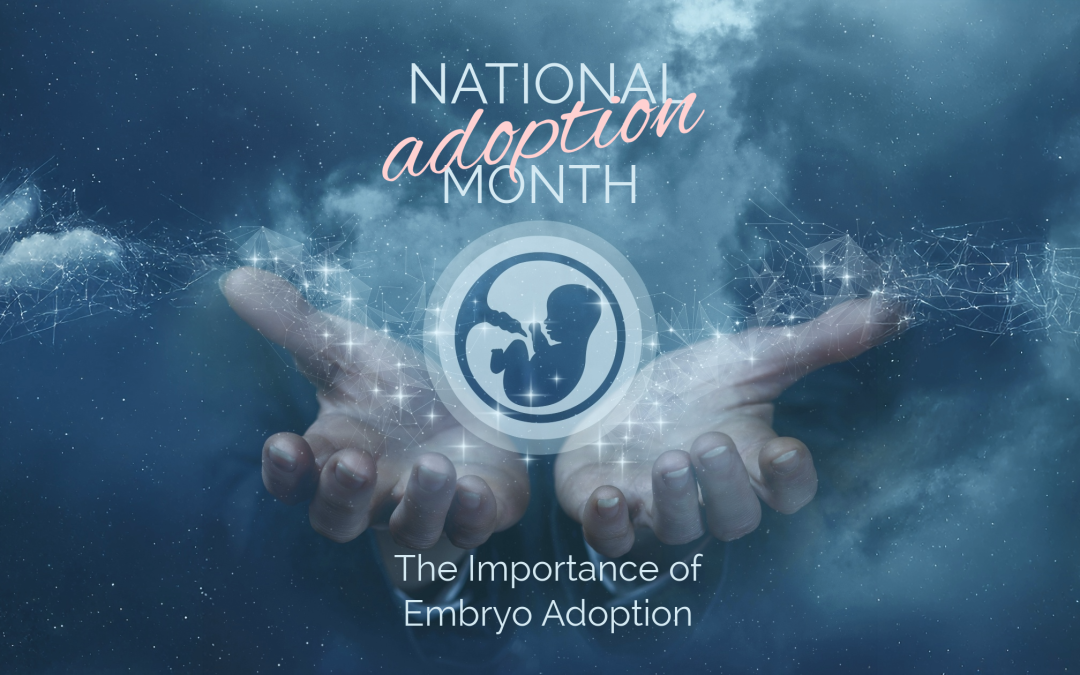Every November, families, communities, and organizations across the country participate in National Adoption Month. It is a time to promote awareness of adoption, celebrate the families created through adoption and advocate for children who need a home.
While many types of adoption, including foster care, domestic, and international adoption, are typically highlighted, embryo adoption is a different type of adoption that may not receive as much attention. We want to recognize and celebrate the families that have been created through embryo adoption as well.
What is Embryo Adoption?
If you are unfamiliar with embryo adoption, it is a unique and life affirming way for hopeful parents to expand their families. Through embryo adoption, embryos that have been placed for adoption by another family who have completed their family building journey through in vitro fertilization (IVF) are transferred to the adoptive mother, who will carry and give birth to the adopted child.
Currently, thousands of embryos are cryopreserved (frozen) in fertility clinics across the nation; these embryos are created by patients through the process of IVF and are most often regarded as “leftover” embryos. Many couples who have completed their family-building journey through IVF choose to donate them to be adopted rather than discard or donate them to science. Many couples see the value in donating their embryos to other individuals or couples who are struggling with infertility; these donors want to ensure that their embryos are used to help start a family and are given a chance to be born.
An Alternative Adoption Story
What makes embryo adoption distinct from a traditional adoption experience is the adoptive mother being able to experience pregnancy and childbirth, even though the child is not genetically related to her. This experience can be especially significant for women who have wanted, but been unable, to conceive a child due to medical challenges, unexplained infertility, or other reasons.
There are also differences legally. Traditional adoption is governed by adoption law. However, embryo adoption is governed by property law and it is a legal transfer of ownership rather than adoption of a living child. Even so, many embryo adoption programs refer to the process as “adoption” because the end result is that the child will be placed with a family to whom he or she is not genetically related.
Why Embryo Adoption Should Be Considered
National Adoption Month is aimed at awareness of the many ways families are formed and supporting the children and parents involved in that process. Embryo adoption is worthy of consideration for many reasons.
1. Giving Life an Opportunity
Many donated embryos, until they are adopted, will likely never be used. Embryo adoption provides a chance for life and brings hope where hope might otherwise be lost.
2. Fulfilling a Dream to Parent
For many couples unable to conceive children using their own eggs or sperm, embryo adoption presents a viable option to build a family through pregnancy rather than traditional (IVF) or surrogacy. Embryo adoption allows the family to experience pregnancy and develop parental bonding beginning at the earliest stages of life.
3. It is Cost Effective
In many cases, embryo adoption costs far less than other options of family building, such as IVF or other forms of adoption. For families looking for alternatives to family building, embryo adoption is not only a viable option, but it is often the most cost-effective alternative.
4. Ethics and Faith-Based Considerations
Many families are drawn to embryo adoption for ethical reasons tied to their ideals or religious beliefs. They may feel ethically compelled to provide opportunities for frozen embryos to be born and raised in a loving home.
Stories of Hope
While embryo adoption is gaining increased visibility, the stories of families who have chosen this path are impactful. Many adoptive parents who have adopted embryos describe the journey as miraculous and humbling.
On the other side of embryo donation, donor families often share how they experience a sense of peace and purpose in knowing that they gave their embryos the chance to be born and be part of another family’s journey.
What You Can Do?
Organizations like the Snowflakes® Embryo Adoption Program provide education, counseling, and matching for both donors and adoptive families. Snowflakes and other organizations help families navigate the emotional, medical, and legal aspects of this process with care, compassion, and sensitivity.
If you are experiencing infertility or know someone who is, or are curious for a unique option to grow your family, embryo adoption is worth exploring!
In celebrating National Adoption Month, we should remember that adoption is diverse. Through foster care, private adoption, international adoption, or embryo adoption, the essence of adoption is the same: to offer children love, hope, and a future. This month should be a celebration of families created through adoption and a time to take the opportunity to raise awareness about the life-giving and beautiful possibility of embryo adoption. Every child’s story begins somewhere, and for some it starts in the warmth of a womb and the love of a family they’ve never met…yet.
To learn more about embryo adoption and donation, visit EmbryoAdoption.org.


Recent Comments